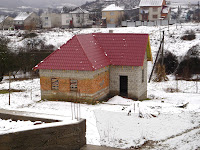
Today, we spent the morning learning about early childhood development and the needs of the child from conception to age three (using Maslow’s Hierarchy of Needs among other theorists).
But, the most powerful part of the day was the end, when we watched a film about a young child named John, who was left by his mother at an orphanage for nine days. There were around 8 children in two rooms being cared for by 3 or 4 nurses.
The black and white film showed how over the course of nine days, the child’s experience day in and day out was impacted to the point that his personality almost completely changed. The first few days he was sad, but calm, by day three he was using a teddy bear as a surrogate mother, while attempting numerous times to sit on the lap of several of the nurses. By day six he was acting out and, because of this, he did get more attention, but by days seven and eight he was depressed and could not be consoled by anyone. He stopped eating and by day nine and there was concern for his health by the nurses. He would go back and forth from belligerent to inconsolable.
On day nine, John’s mother returned. At first, he wouldn’t go to her; he was put in her arms and was calm, but after a few minutes he started screaming again. The mother wanted to comfort him, but couldn’t. The child, after a struggle calmed down again. Several times he left her, hysterically. There was a point near the end when he was sitting on the lap of the parish priest and he looked at his mom with an unbelievably difficult face to forget.
I was reminded of what I know about post-traumatic stress disorder. It is possible to recover from it in a function way, but there is a window of exposure that makes it harder and even impossible to recover. This was nine days – imagine those children growing up in these institutions; not hard to imagine, since it is a reality in Ukraine. It has nothing to do with the nurses not caring for the children. They clearly were doing the best they could, feeding, clothing, bathing and putting the children to bed. But nothing could replace the important bond that forms between a parent and child which contributes to their stable development to adulthood.
The consultant showed us a chart later that showed, roughly, that 75% of our learning in life takes place before the age of three. In this case, could 9 days before the age of three, be equated to months or even years of time as an adult?




 Today rounded out the first day of the "Mother's School" that the ladies of Opika and I put together. Funded by the US Peace Corps through their Special Projects Assistance (SPA) Program, Peace Corps helps support volunteer projects that a) help build civic engagement and/or b) help build the capacity of a nonprofit organization. In this case, we were building the capacity of Opika to respond to a particular sector of the population they serve - teen mothers.
Today rounded out the first day of the "Mother's School" that the ladies of Opika and I put together. Funded by the US Peace Corps through their Special Projects Assistance (SPA) Program, Peace Corps helps support volunteer projects that a) help build civic engagement and/or b) help build the capacity of a nonprofit organization. In this case, we were building the capacity of Opika to respond to a particular sector of the population they serve - teen mothers.










